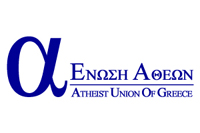When we decided to launch a collective blog with an atheistic content, we sought a title. We concluded that most contributors did not define themselves as atheists, but free-thinkers, skeptics or secularists and viewed atheia as a result of their logical approach of the cosmos, a part of a more general philosophy or ideology. Indeed, the term "atheia" wouldn’t even exist, if its opposite, belief in god, didn’t exist. So why bother with something that doesn’t exist? Why bother publicly declaring that we do not believe in the existence of god?
So, why talk of atheia?
Why not, logic, for instance? Most, if not all of us, use logic as an everyday tool to interpret the phenomena we observe and check the validity of every argument.
Why not skepticism? Our basic characteristics are doubting, studying, checking, not accepting axioms at face value nor do we believe that there is anything that should not be doubted.
Why not materialism? It considers the natural world definitive, primary, the very foundation of existence and conscience, thought and spirit are considered secondary.
We could even mention nihilism, which rejects absolute knowledge, truth and ethics, in contrast to religion, which lays claim on all three.
On a practical level, we all strive for secularism; dividing the spiritual life (whether it goes by the name "religion" or any other name) from politics, education, economy and all areas of secular activity.
And there is no doubt we’re all free-thinkers. We let our minds operated free of all presuppositions, prejudices and superstitions, free from prefabricated beliefs and doctrines. For he who thinks freely, thinks well.
For those of us contributing to this blog, all the previous points are valid. But neither was the cause that sparked the creation of this collective website. Our common denominator, the issue we all care about and want to discuss and express in any way we think of is atheia.
In a world where everyone would be able to think freely and choose her religious views without interference, there would be no reason to talk of atheia. But in a world where religion is more than a simple institution, where religion is above doubt and criticism, where the presence and influence of religion can be traced in society and politics, where religion has special financial advantages, where religious doctrine is taught in public schools and manifest in our every step, from the crucifix behind the podium to the bible on the witness stand, in a world like this an atheist is compelled to share his ideals.
It needs to be more widely know that there is an alternative. That religion is not something necessary nor should we take it for granted in our lives. That someone can live just fine without it. That not only does the atheist miss something, but gains greater freedom both spiritually and in his everyday life.
For many atheia is a word of negative connotations. It is linked to immorality, as if morality is a religious monopoly, or hatred, as if rejecting a belief automatically makes one hate those who accept it.
For us atheia is only positive. It releases the spirit from the constraints of undoubting faith, it rids the mind of metaphysical though and turns the exploration of the world into an objective matter, it brings us face to face with the responsibility of our actions, it gives us the ability to build a society based on man and nature.
We chose to talk of atheia and not atheism. "Atheism" is defined in dictionaries and encyclopaedias, whether we like it or not, as the denial of god (which assumes that god exists and we deny it). Furthermore, the ending of the word "atheism" suggests an ideology, while "atheia" is not an ideology. It is not a system of beliefs, it is not an finely woven net of ideas.
The greek word "atheia" defines the lack of belief in god and in the supernatural.
No more, no less
After many suggestions as to what the name of our collective website should be, after many discussions online and offline, after considering logic, skepticism, secularism and free-thought and agreeing that while all of these concepts express us, but none is our focal point, we finally settled on the name you see: ATHEIA.










Δεν υπάρχουν σχόλια:
Δημοσίευση σχολίου